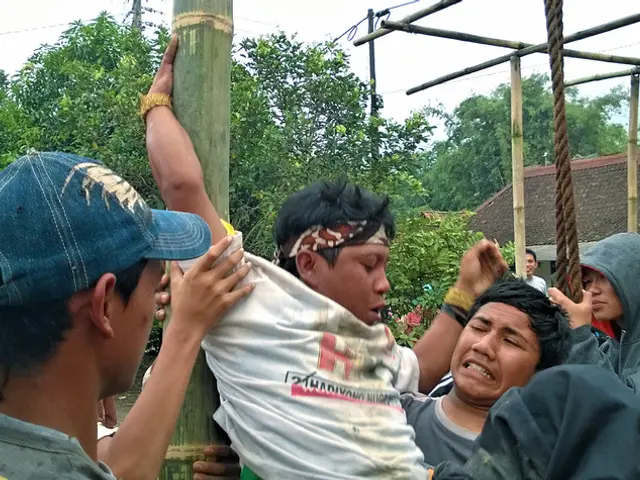Regenerative Waste Management: Transforming Challenges into Opportunities through Permaculture Techniques
In the realm of eco-friendly living, permaculture stands out as a revolutionary approach to waste management. This system, co-founded by Bill Mollison, emphasizes the importance of transitioning from consumption to production, viewing waste not as a problem but as an opportunity.
Composting, a key part of permaculture, transforms organic waste into nutrient-rich soil through decomposition. Kitchen scraps and garden waste, when composted, create soil amendments that return organic matter to the earth, reducing landfill waste.
Vermicomposting, a refined form of composting, utilizes worms to break down organic matter more efficiently. Systems like these can be effective in small gardens or large farms, with research showing that worm castings have more nutrients than regular compost. This process not only reduces landfill waste but also lowers greenhouse gas emissions by up to 40%.
Mulching, another permaculture practice, improves soil fertility and retains moisture. Common mulches include wood chips, rocks, straw, grass clippings, and even plastic. Grass clippings, when spread out and turned, can increase nitrogen by 10%.
Permaculture also encourages upcycling and repurposing materials. For example, old tires can be used as planters, and glass bottles can serve as garden bed edges. Buying local goods is another permaculture principle, cutting down on packaging waste, lowering carbon emissions, and boosting the local economy.
In small spaces, permaculture encourages maximizing vertical growth and interplanting, which indirectly reduce waste by optimizing resource use and minimizing excess. Using cover crops and compost teas supports soil vitality without chemical inputs.
The main goal of permaculture waste management is to create closed-loop systems and aim for zero waste. The principles of "Redistribution of Surplus" and "Produce No Waste" are central to this approach, encouraging sharing excess resources rather than wasting them, and creative reuse and recycling.
However, not all waste is created equal in permaculture. For instance, not all leaves compost well; oak leaves may take years to break down.
Insect-based organic waste management (IBOWM), such as raising Black Soldier Fly (BSF) larvae, converts food waste into high-value biomass and fertilizer. This method can reduce organic waste volume by over 70%. Feeding food scraps to backyard livestock, such as chickens or pigs, also closes the nutrient loop and reduces waste output.
Adopting the holistic thinking of permaculture requires creativity and openness. By integrating waste into household ecosystems, we can foster sustainability by transforming waste into resources like fertilizer and feed rather than sending it to landfill. Such techniques also support soil health and biodiversity, key permaculture principles.
In conclusion, practical permaculture waste management techniques for households offer a sustainable solution to waste management. By reducing waste through biological recycling systems, enhancing soil fertility, and reducing environmental impact by avoiding landfill and synthetic fertilizers, we can contribute to a greener and more sustainable future.
- Adopting worm-based composting, a refined form of regenerative gardening, transforms organic waste into nutrient-rich soil, reducing landfill waste and lowering greenhouse gas emissions.
- In permaculture, upcycling and repurposing materials from home-and-garden activities, such as using old tires as planters or glass bottles as garden bed edges, promotes sustainability and boosts the local environment.
- The principle of scientific environmental-science underpins permaculture waste management, encouraging the development of closed-loop systems that prioritize regenerative soil health and aim for zero waste.
- Greywater, the partially used water from kitchen sinks, showers, washing machines, and baths, can be intelligenty used in permaculture to water gardens, reducing water consumption and improving soil health.
- Permaculture lifestyle emphasizes interplanting and maximizing vertical growth in small spaces, indirectly reducing waste by optimizing resource use and minimizing excess, while also supporting soil health and biodiversity.




